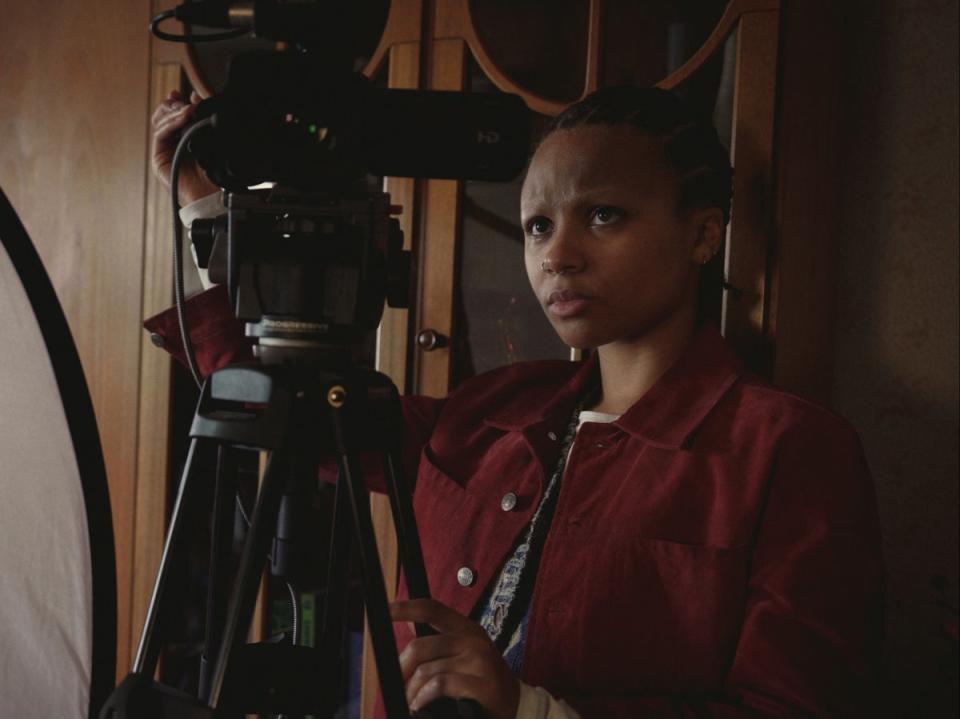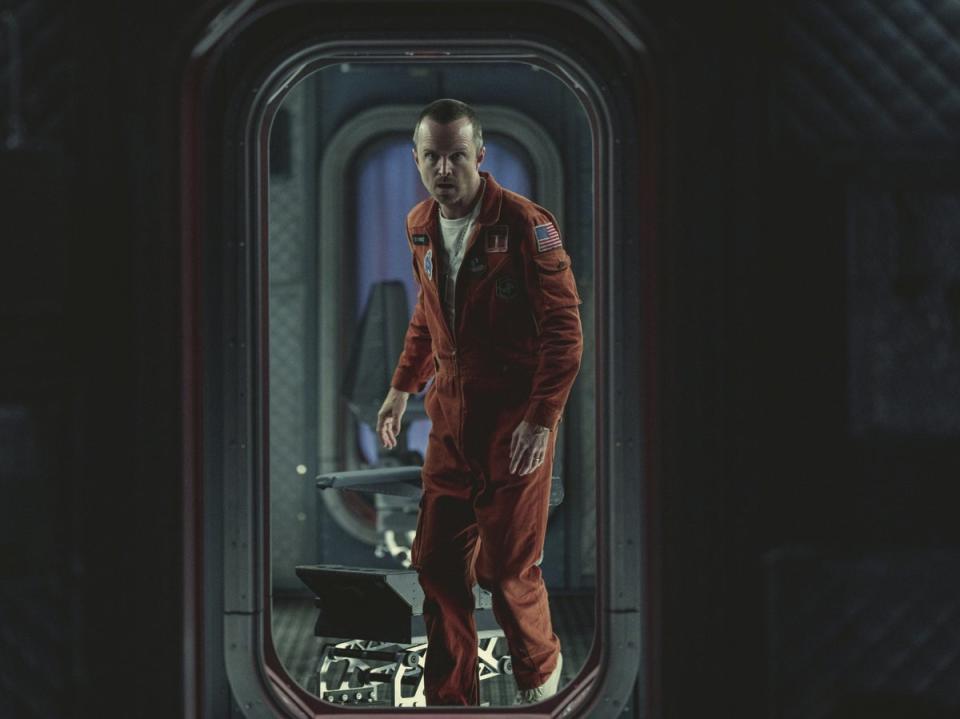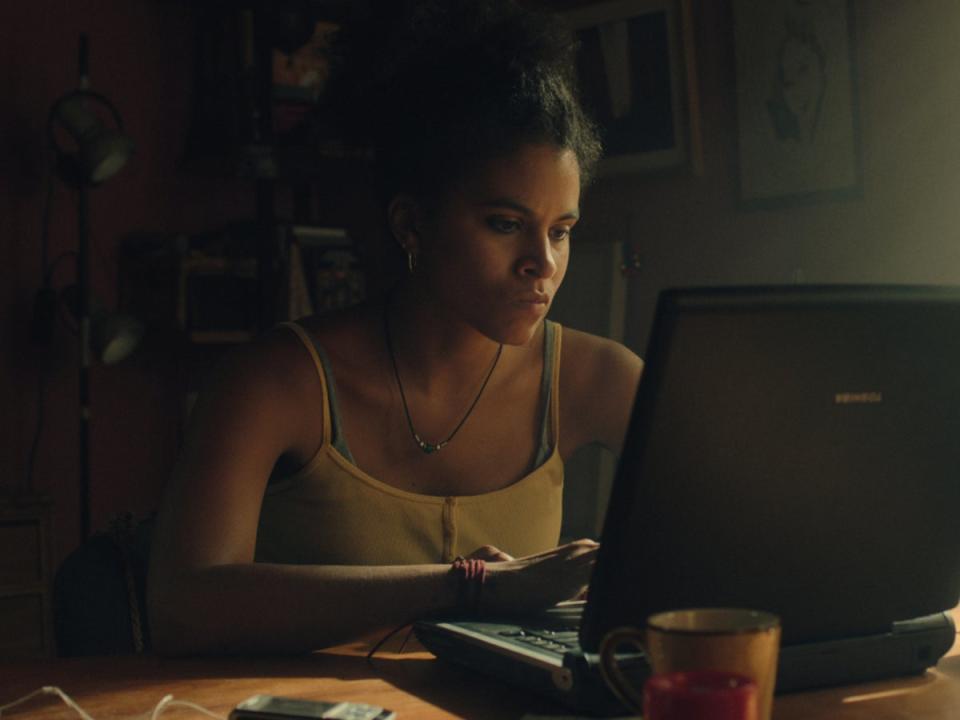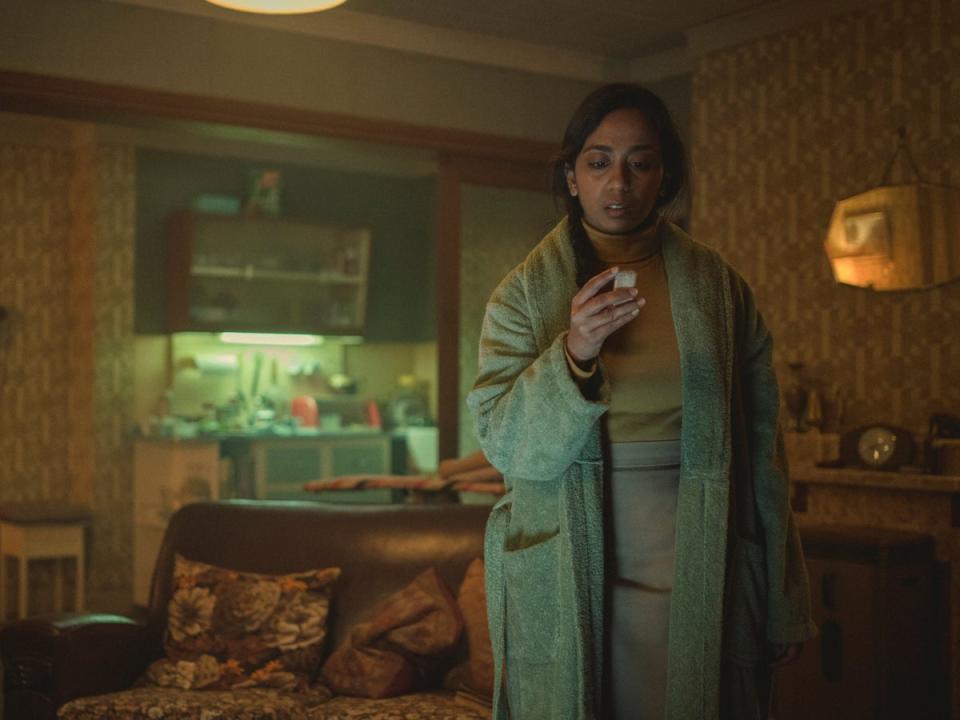Black Mirror season six review: Charlie Brooker’s sci-fi mishmash needs to stop messing with a winning formula
- Oops!Something went wrong.Please try again later.
- Oops!Something went wrong.Please try again later.
Reviewing a season of Black Mirror is like reviewing the British weather. One moment you’re basking in the sun, the next you’re being drenched with rain. When Charlie Brooker’s speculative anthology series, predominantly concerned with our technological future, first aired in 2011, it was hailed as both brilliantly acerbic and powerfully prescient. But as the years have gone on – and as the series has moved from Channel 4 to Netflix, employing ever more American stars – the quality has become more variable. Like the weather.
Four years after the release of series five – which suffered a significant dip in critical reception – Black Mirror is back with a five-episode season. Tackling issues from artificial intelligence to automaton clones, via genres ranging from black comedy to supernatural horror, the new series is inflected with classic Black Mirror tropes but also brings something new. For the first time, Black Mirror is not merely holding the looking glass up to the damage wrought by technology, but to the self-inflicted wounds of society as well. The resultant mishmash demonstrates that the best episodes of Black Mirror will always be dystopian, and experimenting with that winning formula is a fool’s errand.
Joan is Awful â â â â â
Joan (Annie Murphy) is a middle manager at an amorphous tech firm. She’s having a bad day: the coffee tastes like garbage, she has to fire an employee, her ex is in town and hitting her up, and she vents about her milquetoast relationship to the paid ears of her therapist. She’s shocked, therefore, when she returns home and, scrolling through Streamberry (in a Netflix dupe), sees a show called Joan is Awful, starring Salma Hayek as someone who looks an awful lot like her. Thus begins her slow descent into chaos.
“Joan is Awful” is, in many ways, the most classic episode of Black Mirror in this season. High concept, it deals with the impacts of personalised content, privacy invasion and deep fakes. “I feel like I’m not the main character in my life story,” Joan says, before her reality begins to disassemble. It’s also the episode that best reminds viewers that Black Mirror started life with a story about the prime minister getting amorous with a pig on live television. Irreverent, scatological, and nightmarishly claustrophobic, “Joan is Awful” is an excellent instalment in Black Mirror’s catalogue of Orwellian farces.

Loch Henry â â â ââ
“Loch Henry” first appears as an option on Streamberry during “Joan is Awful”. “I can’t really do another true crime,” comes the verdict of Joan’s fiancé. The true crime in question is the historic murder of some honeymooners in the Scottish Highlands, a subject that Davis (Samuel Plenkin) and Pia (Industry’s excellent Myha’la Herrold) decide would make a fitting topic for their graduate documentary project. Of course, this being Black Mirror, all is not quite what it seems, and a sterling cast of locals (including Monica Dolan, John Hannah and Daniel Portman) bring an increasing sense of unease to this dredging of past trauma.
As a standalone, hour-long piece of meta true crime, Loch Henry is effective. Plenkin and Herrold stay – just about – on the right side of annoying (“I thought you were in London studying woke film theory,” comes the earthy verdict of Portman’s publican). As the plot progresses, shades of David Fincher’s The Girl with theDragon Tattoo appear, and “Loch Henry” frequently shapes like it’s about to burst into full horror. Whether through restraint or lack of ambition, that generic metamorphosis never happens, and ultimately the episode becomes a little limp. There is a vague, underlying commentary on the commercialisation of tragedy (a critique that feels very contemporary, and not at all speculative) but little to root this in the traditions of great Black Mirror episodes. “That’s real,” Davis laments, of his family history. “That’s not f***ing content!” Well, it’s not really f***ing Black Mirror either, though, is it?

Beyond the Sea â â â â â
David (Josh Hartnett) and Cliff (Aaron Paul) live very separate lives, down in 1960s America. David and his beautiful brood live in a modernist house in California, and he struts around like an all-American hero; Cliff, his wife Lana (Kate Mara) and their son have just relocated to a rural idyll where they chop wood and tickle trout from babbling brooks. These men, however, are “replicas”, mint-condition robots controlled by the consciousness of the real David and Cliff, who are serving a six-year mission on a space station. But the programme is proving controversial. “A man sleeps in the sky while his mechanical image walks the earth,” says Rory Culkin’s Mansonesque hippy, who breaks into David’s home and kidnaps his wife. “And you share your bed with this abomination?”
From this central tragedy, the drama spins off in two locations. The men, trapped in their tin can, floating hundreds of miles from Earth, and robot Cliff, home on the ranch, and now remotely operated by both men. Like the very best episodes of Black Mirror, this is gloomy, high-concept stuff, and the A-list cast excels in this 80-minute character study, which essentially becomes a very human three-hander between David, Cliff and Lana. The Hartnaissance (he is due to appear in Christopher Nolan’s Oppenheimer this summer after a quiet second decade to his career) is well and truly on, while Paul and Mara crackle as a brittle couple struggling with their, um, long-distance relationship (though Mara’s agent ought to note that she’s in danger of being typecast as an adulteress).
At its core, “Beyond the Sea” has the key to a great Black Mirror chapter: slow-burning dread and myriad ways for things to go wrong. Already at a quasi-feature length, the episode could easily have used an extra half-hour to come to the boil – the climax is a little rushed – but it tackles big sci-fi issues, the sort addressed in films like Moon and Sunshine, with superb confidence.

Mazey Day â â âââ
Mazey Day (Clara Rugaard) is a young actor, struggling with the pressures of Hollywood franchise life. On location in the Czech Republic, she gets high and hits someone with her car. Back in Los Angeles, Bo (Zazie Beetz) is an invasive paparazzo, whose snooping has just resulted in the suicide of a minor television celebrity. “Half of these assholes would kill themselves if we didn’t take their picture,” a cynical fellow pap tells her. She’s able to compartmentalise the guilt as she’s tasked with establishing Day’s whereabouts after the actress is booted off set and disappears from public view. With a $30,000 bounty placed on a photograph of the troubled starlet, Bo heads off, following the scent.
In every season of Black Mirror, there’s an episode that feels a real bugger’s muddle. “White Bear”, say, from season 2, or season 5’s “Smithereens”. “Mazey Day” fulfils that role in the latest tranche of episodes, proving that Brooker is as capable of inanity as profundity. Set in the mid-Noughties (the birth of Suri Cruise is announced on the radio in the opening) and taking aim, in quite a ham-fisted way, at the tabloid culture that harangued celebrities, “Mazey Day” is the apex of the issue with these latest episodes: it has nothing to do with technology, nor is it making a substantive dissection of the modern moment. Put aside the fact that the episode dissolves into a melange of sub-horror fantasy tropes, and the representation of paparazzi culture here seems a rather Nineties and Noughties obsession. Slender (it’s just 40 minutes long) and scattershot, it is also a rare episode of Black Mirror that feels actively backwards looking.

Demon 79 â â â â â
It’s 1979, and the Winter of Discontent has left Britain on a political knife edge. Callaghan’s government is in crisis, and right-wing firebrands are swarming through the north of England, inciting racial unrest. Nida (Anjana Vasan) lives in a house which is daubed with National Front graffiti and works in a shoe store where she is routinely victimised by colleagues. When she finds a talisman in the basement, and accidentally imbues it with her blood, she inadvertently summons the demon Gaap (Paapa Essiedu) from the bowels of hell. He tells her – taking the form of the lead singer of Boney M – that she must make three human sacrifices, over three days, in order to stop the world from burning up in the fires of nuclear war. And so begins a tough week for Nida.
It’s easy to forget – as Black Mirror has achieved global domination and a massive Netflix deal – that Brooker began his career on comedy TV projects like Brass Eye and Nathan Barley. Of all the episodes in this new series of Black Mirror, “Demon 79” is the closest to a comedy. Sure, there’s some graphic violence involving people being bludgeoned to death with bricks and hammers, but there’s also a foundational buddy comedy element in the mismatched partnership between Nida and Gaap, who will be kicked out of “demon school” if she doesn’t complete her triple-murder. “I would endure a profound, palpable and ever-present lack of existence,” he tells Nida, imploring her to pick up her hammer. “Sounds like my life,” she deadpans back.

At 75 minutes long, “Demon 79” flirts with the same scope as “Beyond the Sea”. Tonally, it is not dissimilar to Drew Goddard and Joss Whedon’s The Cabin in the Woods, braiding violence, comedy and apocalyptic ennui into a slick plait Like “Mazey Day”, it is more nostalgic than the prophetic, Dickensian (that’s Philip K Dick, I mean, not Charles Dickens) episodes, but the issues of 1979 Britain feel strikingly (no pun intended) present. Spiralling fuel costs, industrial action, far-right demagoguery: “Demon 79” isn’t a prediction for our technological future, but an escapist fantasy from our political present.

